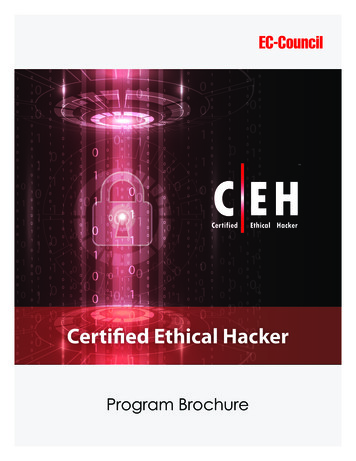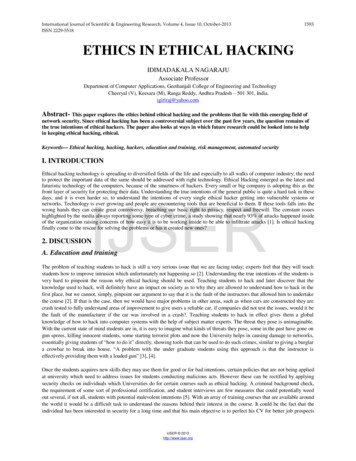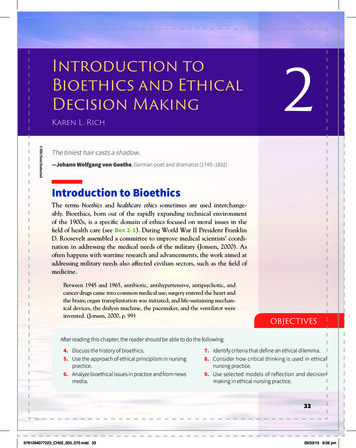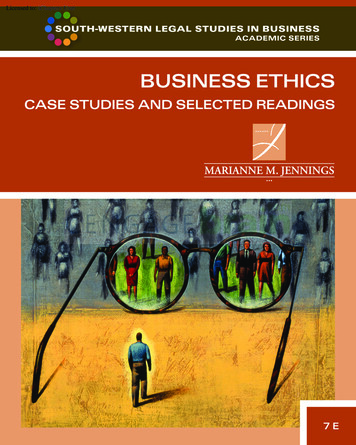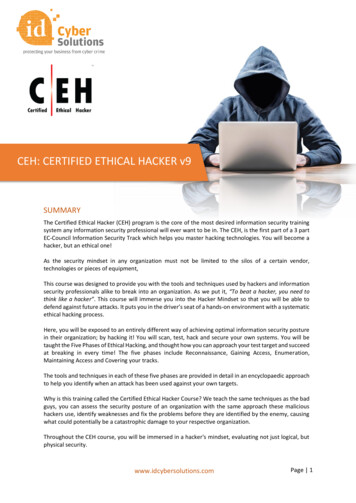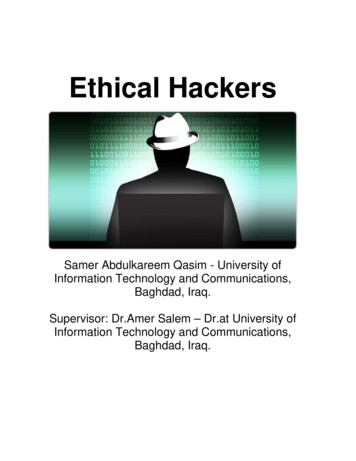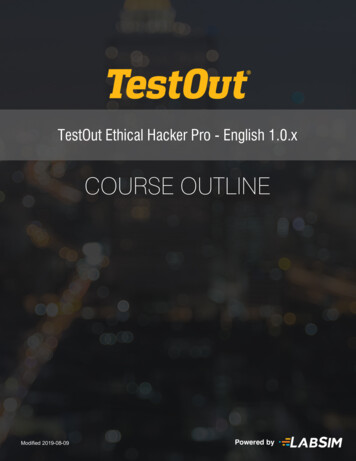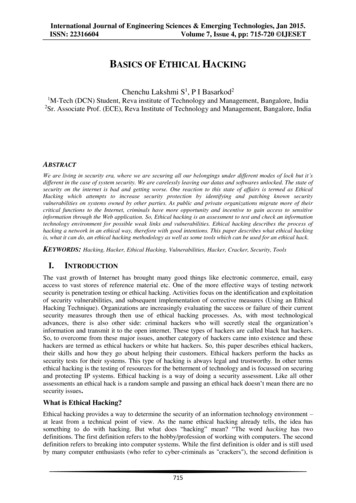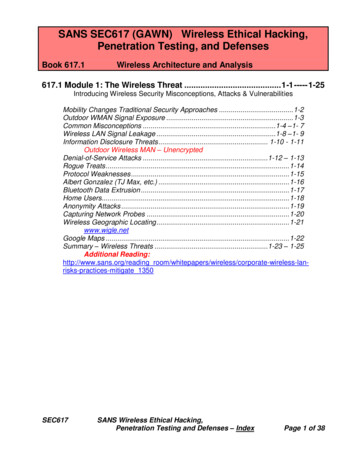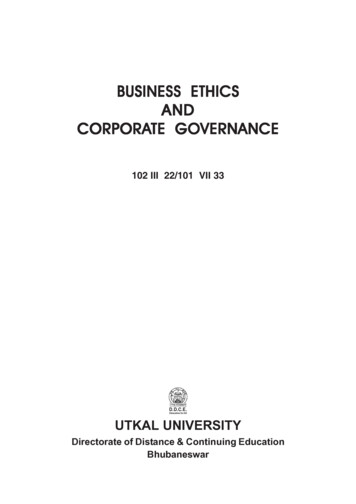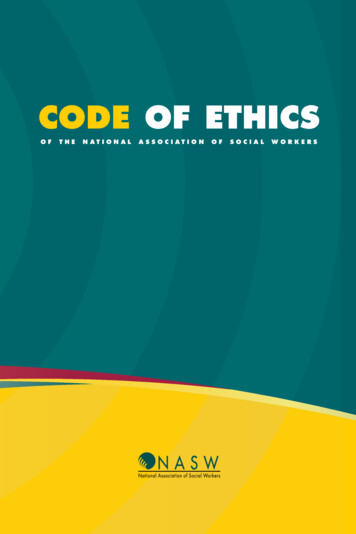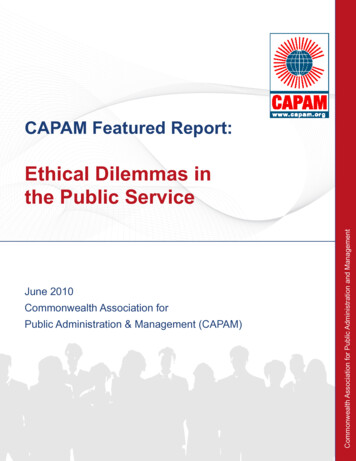
Transcription
CAPAM Featured Report:June 2010Commonwealth Association forPublic Administration & Management (CAPAM)Commonwealth Association for Public Administration and ManagementEthical Dilemmas inthe Public Service
Commonwealth Association for Public Administration andManagement (CAPAM)L’Esplanade Laurier300 Laurier Avenue WestWest Tower, Room A-1245Ottawa, ON Canada K1N apam.orgFor more information, please visit: www.capam.orgCopyright Commonwealth Association for PublicAdministration and Management, 2010. All rightsreserved.The views and opinions expressed in each document reflect those of the authorand do not necessarily reflect those of CAPAM. The material in this publication isbased on sources that we believe to be reliable. While every care has been takenin the preparation of this publication, CAPAM gives no warranty that the sourcesare correct.C A P A M F E A T U R E D R E P O R T : E t h i ca l d i l emma s i n t h e pu b l i c s er v i ce
IntroductionAs a non-profit association, CAPAM represents aninternational network of 1100 senior public servants,Heads of Government, leading academics andresearchers located in over 50 different countriesacross the Commonwealth. The association is guidedby international leaders that believe in the value ofnetworking and knowledge exchange and the promotionof good governance for the betterment of citizens livesacross the Commonwealth.CAPAM’s mission is to promote the practical requirementsof good governance, just and honest government acrossthe Commonwealth countries and beyond. CAPAMprovides a forum for the active exchange of innovations,knowledge and practice in citizen-centered servicedelivery, leadership development and growth, andpublic service management and renewal. We serve ourmembers as a centre of excellence in good governanceand endeavor to build a more responsive and dynamicpublic service.AcknowledgementsCAPAM would like to thank and acknowledge theleadership and management of the Government ofNigeria, through the Head of Service of the Federationand their tremendous efforts as partners in theorganization of the conference. In particular, we wouldlike to extend our appreciation to Mr. Stephen Oronsaye,Head of Service of the Federation, Ms. Amal Pepple,CAPAM Board Member, Nigeria and the Local OrganizingCommittee.CAPAM extends great appreciation and thanks to thecontributing authors in this publication. The authorsoffered not only their expertise and knowledge, butthe lessons and good practices of their respectiveorganisations. Their efforts have contributed tothe fostering of exchange and dialogue betweenCommonwealth countries.The purpose of CAPAM Featured Reports is to presentand capture strategies, approaches and implementationchallenges in three main areas; human resourcemanagement & governance, leadership in the publicservice, and innovations in citizen centered servicedelivery. This publication will serve as a knowledgetransfer tool that complements and extends the sharingand learning process of CAPAM conference programmesand activities.Each series offers a continued learning and analysis toolfor practitioners, academics and experts. The cases andpapers bring together various country approaches forcomparative and sharing purposes.Ethical Dilemmas in the Public ServicePapers and cases included in this publication draw frompresentations or paper submissions for the CAPAM GoodGovernance , Accountability and Trust Conference heldMay 18 - 20, 2010 in Abuja, Nigeria, in partnership withthe Government of Nigeria through the Head of Federationof Service. The purpose of this report is to present andcapture some ethical dilemmas public servants face intheir everyday activities.C ommo n wea l t h A s s oc i at i o n for P u b l i c A dm i n i s trat i o n a n d M a n a g eme n t3
Table of ContentsEthics, Ethical Dilemmas and the Public ServiceDr. David Menyah, Manager, Programme Development, CAPAM45Issues of Ethics and Professional ValuesDr. Roger Koranteng, Adviser, (Governance) Governance and InstitutionalDevelopment Division (GIDD), Commonwealth Secretariat, UK10Reflections on Public Service Dilemmas: Nigeria’s ExperiencesDr. Gabriel Gundu, Consultant, Public Administration, Uganda ManagementInstitute14Clash Between Religious Values and Regulations Governing the Conduct ofPublic OrganizationsBashi Mothusi, Centre of Specialization in Public Administration & Management(CESPAM), University Of Botswana20Reflections on Ethical Dilemmas in the Implementation of a New PerformanceAppraisal System (Pas) in the Public Service, the Kenyan CaseDr. Margaret Kobia, Director, Kenya Institute of Administration (KIA)22Reflections on Ethical Dilemmas: A South African PerspectiveProfessor Solly Mollo, Director General, PALAMA, South Africa25Reflections on Ethical DilemmasDr. Goke Adegoroye, Permanent Secretary, Federal Capital Territory, Abuja,Nigeria30C A P A M F E A T U R E D R E P O R T : E t h i ca l d i l emma s i n t h e pu b l i c s er v i ce
Ethics, Ethical Dilemmas and thePublic ServiceDr. David Menyah, Manager, Programme Development, CAPAMIntroductionThe reputation and success of governance depends uponthe conduct of public functionaries and what the publicbelieve about their conduct. It is therefore of fundamentalimportance that public functionaries act justly and fairly toall, not only paying lip service to ethical conduct but alsoensuring that these are manifestly and undoubtedly seento be done. It is imperative that all public functionariesupon accepting government employment recognize thatthey have a special duty to be open, fair and impartial intheir dealings with society. Personal self-interest shouldbe subordinate to the public good in all circumstances,especially if circumstances arise where the possibility of aconflict of interest may become an ethical dilemma.Ethics and Ethical Dilemma DefinedThe meaning of ethics is contested. While some authorsdefine it in terms of what it is not, referring to matterssuch as misconduct, corruption, fraud and other types ofillegal behavior, others refer to notions of integrity, honesty,personal values and professional codes. The first of thesetwo ways of defining ethics is the anti-corruption approachand the second is the integrity approach (Uhr, 2002). Theanti-corruption approach frames discussion about ethicsin negative terms. The integrity approach frames ethics inpositive terms. Yet there appears to be general agreementthat ethics is about relationships. Several writers argue thatethics can be divorced from religion and/or from morality butmost refer to its religious and philosophical bases. Ethics‘is about what we ought to do’ (Freakley & Burgh, 2007).It requires a judgment be made about a given problem orsituation. Further, the term, ethics, ‘is sometimes used torefer to the set of rules, principles or ways or thinking thatguide, or claim authority to guide, the actions of a particulargroup’ (Singer 1994). For instance, Codes of Conductidentify standards of official conduct that employees areexpected to perform.Ethics, then, could be considered to be ‘about how weought to live. What makes an action the right rather thanthe wrong, thing to do? What should our goals be?’ ‘Ethicsis about positive not negative values’. It ‘is about askinghard questions about values, giving honest and publicanswers, and living by them’. By extension, ‘public sectorethics [is] about how we live our lives together in publicsector institutions’ (Preston & Samford, 2002).Viewing ethics in this light indicates that people are facedwith choices requiring them to make decisions enablingthem to lead an ethical life within the context of theirrelationships with others. This suggests that people canbe placed in ethical dilemmas. An ethical dilemma arisesfrom a situation that necessitates a choice betweencompeting sets of principles. Thus an ethical dilemma canbe described as a circumstance that requires a choicebetween competing sets of principles in a given, usuallyundesirable or perplexing, situation. Conflicts of interestare possibly the most obvious example that could placepublic sector leaders in an ethical dilemma. Other typesof ethical dilemmas in which public servants may findthemselves include conflict between: the values of publicadministration; justifications for the institutions; aspectsof the code of conduct; personal values and supervisor orgovernmental directive; professional ethics and supervisoror governmental directive; personal values and professionalethics versus governmental directive; blurred or competingaccountabilities; and the dimensions of ethical conduct(Cranston, Ehrich & Kimber 2002, Edwards 2001, Preston& Samford 2002).Ethical Dilemmas Faced by Public ServantsSome of the most common ethical dilemmas with whichpublic servants are confronted, revolve around aspectssuch as: administrative discretion corruption nepotism administrative secrecy information leaks public accountability policy dilemmasAdministrative DiscretionPublic officials are not merely executors of public policy.They make decisions pertaining to the lives of people, forexample, about taxes, survival and the dismissal of people.In doing so they exercise discretion. The question is thenhow decisions are to be made to avoid ethical dilemmas.C ommo n wea l t h A s s oc i at i o n for P u b l i c A dm i n i s trat i o n a n d M a n a g eme n t5
In other words, the promotion of general welfare dependsto a large extent on the use or abuse of administrativediscretion.It is true that within the rules and regulations laid downby legislation and within the prescribed procedures,there is ample opportunity for the public official to use hisdiscretion. When faced with alternatives the choice of thepublic official poses an ethical problem: the choice may beacceptable to only a small section of society. The problemis that the selection of one path of action from amongseveral alternatives is often made on the basis of personalpreference, political or other affiliations, or even personalaggrandizement, thereby disregarding known facts andthus the possibility of rational decision making. It could wellbe that all the prescribed rules, regulations and proceduresare adhered to but that the discretionary choice may beviewed as unethical or even corrupt.CorruptionThe majority of officials uphold the high standards requiredby public office and are devoted to promoting the generalwelfare. The ethical standards of public officials are,however, directly related to society as a whole. If the publicaccepts that in order to secure an expeditious responsefrom a public official some pecuniary or other incentive isnecessary, and the official accepts the incentive, then thestandards of ethical conduct of officials and the public arein fact in harmony from the point of view of the public.The corruption of public officials by private interests isusually very subtle, for example, favors by the public tothe official under obligation and he gradually substituteshis public loyalties to those doing him favors. The ethicaldilemma that faces the public servant with regard to corruptpractices as result of private interests primarily concernshis reaction to the situation. If a corrupt practice or anattempt to corruption is discovered, it is quite possible thatthe official’s personal loyalties or party political affiliationsmay be in conflict with his official duties. Should he sacrificethe public interest or try to end the corrupt practice by directpersonal confrontation, or should he blow the whistle on thepractitioner of corrupt practice?Administrative SecrecyAn area which lends itself to the creation of situationsand actions which could prove to become major ethicaldilemmas is the secret conduct of public business. This isespecially so because secrecy can provide an opportunity tocover up unethical conduct. Secrecy is an ally of corruptionand corruption is always practiced in secrecy. It is generally6accepted that in a democracy the people have a right toknow what the government intends to do and it would bein the interest of the public for the administration of publicaffairs to be conducted openly.NepotismThe practice of nepotism (the appointment of relations and/or friends to public positions, thereby ignoring the meritprinciple), may lead to the downgrading of the quality of thepublic service. This disrupts the esprit de corps and trustand resulting in corrupt administration, owing to the abilityof a select few to impair control measures on account oftheir personal relationship with the policy-maker, and byreason of their not being easily dismissed or replaced byothers. In other words, those who are appointed with theview that they will conform to the standards and views oftheir appointing authority could prove to be problematic.The preferential treatment of one individual over another,without taking into account the relative merit of therespective individuals, represents nothing but victimizationof an individual or individuals.Information leaksOfficial information is often of such a sensitive nature(for example, pending tax increases, rezoning land,retrenchment of staff) that disclosure of the information canlead to chaos, corrupt practices or, for some individuals,improper monetary gains. Leaking official informationat a date prior to the public announcement thereof is aviolation of procedural prescriptions and can be an ethicaldilemma.Public AccountabilitySince public officials are the implementers of public policies,they ought to be accountable for their official actions totheir superiors, the courts and the public. It is nevertheless,possible for them to hide behind prescribed procedures, thecloak of professionalism and even political office-bearers.Policy dilemmasPolicy makers are often confronted by conflictingresponsibilities. They have specific loyalties to theirsuperiors, but also to society. They have freedom to acton behalf and in the interest of others, but they must alsoanswer to others - their superiors and society – for theiractions. The official’s obligation to respect the politicalprocess may conflict with his view on how the objects ofpolicy making are treated. In other words, the dilemma ofthe public official is the clash between his view of the publicC A P A M F E A T U R E D R E P O R T : E t h i ca l d i l emma s i n t h e pu b l i c s er v i ce
interest and the requirements of law.seem convincing enough to be released prematurely asconclusions.Other Problem AreasApart from the areas of possible conflict referred to above,other problem areas from which ethical dilemmas may arisecan be identified, inter alia: the political activity of public servants resulting in dividedloyalty on the part of those officials who sympathizewith the views of a specific political party; Other more subtle ethical problems, such as the abuseof sick leave privileges, extended tea breaks and theviolation of office rules in general.Dilemma of the public servantThe potential areas for conflict are not necessary ethicaldilemmas in themselves. It is what the public servant doeswhen he is confronted by activities pertaining to thesephenomena that could prove to be the ethical dilemma:1. Would he keep silent when he finds that administrativediscretion is abused, or that corruption or nepotism arepracticed?2. Or should he blow the whistle?3. Should he actively engage in pressure group activitiesbecause he sympathizes with their views?4. Should he actively participate in party politics?5. Or should he endeavor only to promote the public goodand uphold the high standards of public office?Ethical Dilemma Case Study TypesAn ethical dilemma case study is a portrayal of an actualor fictitious scenario, usually multifaceted and illustrateinstances dilemma. Under the more generalized categoryof case study exists several subdivisions, each of whichis custom selected for use depending upon the goalsand/or objectives. These types of case study include thefollowing:Illustrative Case StudiesThese are primarily descriptive studies. They typically utilizeone or two instances of an event to show what a situationis like. Illustrative case studies serve primarily to make theunfamiliar familiar and to give readers a common languageabout the topic in question.Exploratory (or pilot) Case StudiesThese are condensed case studies performed beforeimplementing a large scale investigation. Their basicfunction is to help identify questions and select types ofmeasurement prior to the main investigation. The primarypitfall of this type of study is that initial findings mayCumulative Case StudiesThese serve to aggregate information from several sitescollected at different times. The idea behind these studiesis the collection of past studies will allow for greatergeneralization without additional cost or time beingexpended on new, possibly repetitive studies.Critical Instance Case StudiesThese examine one or more sites for either the purposeof examining a situation of unique interest with little tono interest in generalizability, or to call into question orchallenge a highly generalized or universal assertion. Thismethod is useful for answering cause and effect questionsSample Ethical Dilemma CaseNwankwo is a senior public servant who has worked in twoState public service departments over a twenty-year period.Prior to this he was employed as a chartered accountant.In the course of performing his duties, involving primarilymonetary and budgeting issues, Nwankwo becomes awarethat public revenue is being used inappropriately. While heis not directly responsible for this aspect of the budget, heraised his concerns about the channeling of funds from onepart of the budget to another to Uche, the Head of Division.Nwankwo learns that not only is Uche aware of this practice,but also that he condones it. Not long after, Nwankwo issummoned to talk to Uche and to the Director-Generalabout the issue. In preparation for this meeting Nwankwoprepares a short paper that identifies his understanding ofthe key issues and presents this to Uche and the DirectorGeneral. Due to the politically sensitive nature of the issue,Nwankwo is told that the matter is not within his jurisdictionand therefore he should ‘keep his nose out of it’. This adviceis based on the fact that the incumbent government willnot tolerate questions about how it puts its budget togetherbut that it also faces electoral defeat if the matter were tobe made ‘public’. Nwankwo and his two supervisors areacutely aware of the tensions between the department, theminister and the government. This unease manifests itselfaround the advice the department provides the ministerwith, and the advice that the minister and the governmentwant to hear in particular: After much soul searching,Nwankwo decides to obey his supervisors by leaving thematter alone.Commentary and DiscussionThe critical incident in this situation can be summarized asthe misuse of public money with senior officials trying toC ommo n wea l t h A s s oc i at i o n for P u b l i c A dm i n i s trat i o n a n d M a n a g eme n t7
hide the fact. There seem to be several dominant forcesat play in Nwankwo’s ethical dilemma. It is apparent thatNwankwo draws upon his beliefs about ethical conductfrom his training as an accountant, thus professionalethics is one of the key forces bearing upon his decision.His professional ethics derive from his beliefs about theappropriate role of public employees in serving the publicinterest. There is the expectation that public servants will usepublic funds in defensible and ethically accountable ways.The society force refers to key players, such as taxpayers,public servants, government members and groups servedby a particular department, who stand to lose in some wayby the misuse of public funds. The political framework alsoappears to be a pervading force in the case study, sincethere is the politicization of advice evident in the tensionbetween the department, on the one hand, and the minister,on the other hand.Legal, institutional and organizational factors may haveinfluenced Nwankwo’s thinking regarding the dilemma also.The legal factor not only relates to public sector legislation(e.g. Whistleblower Protection, Freedom of Information, andother important guidelines), but what is perceived as legaland illegal behavior for government officials as well. As forthe legal factor, the institutional factor concerns codes ofconduct and pertinent policies and guidelines that outlinecorrect procedures for reporting incidents like the unethicalbehavior of colleagues.Finally, whether the organizational culture in which Nwankwoworks is reliant upon relationships of trust (or lack thereof)among organizational members and whether the actions(and past actions) of leaders support or discourage peoplefrom reporting unethical behavior are questions of somesignificance, as an organizational culture that fosters trustand enables leaders to model ethical behavior is one inwhich organizational members will be encouraged to makeethical decisions.The political factor seems to be the most potent in directingNwankwo towards a resolution to the dilemma sincehe chooses to accept the advice of his supervisors andnot to pursue the matter further. By taking this action,Nwankwo risks his commitment to an independent publicservice and to the professional code of conduct governingaccountants. The implication of Nwanko’s decision on thedepartment and government is minimal since the practiceof misrepresenting funds remains hidden and no blame isapportioned to them. This situation is not the case for thecommunity as the inappropriate use of public funds couldhave dire implications for community members who maybe disadvantaged in some way or another. While Nwankwodoes not lose his job, does not defy his supervisors, and8does not leak this matter to the press, he personallyexperiences a lingering sense of doubt and guilt that hedid not make the best decision at the time. It is evidentthat Nwankwo’s personal and professional values weresignificantly tested by this dilemma.It could be argued that the situation Nwankwo finds himselfin might be described as one of multiple and conflictingvalues or accountabilities. There appears to be tensionsamong sets of competing values. Possible conflictsinclude:1. Obeying supervisors’ directives versus following hisown personal values2. Choosing to serve the best interests of the communityversus the need to be responsive to the government ofthe day; and3. Following his professional ethics versus his desire tomaintain his career.In this illustration, there is little doubt that Nwankwo wascaught in a highly complex dynamic milieu of factors. Thecase reinforces the point that public servants do not workwithin a political vacuum; the context is highly politicized.Public officials also control, in various ways, the use offinancial and other valuable resources provided by thecommunity. The use, and misuse of those resources raiseimportant questions of professional ethics for administrators.It is similarly expected that those public officials whocontrol the financial and other resources provided bythe community have an ethical obligation to ensure thatthose resources are used efficiently and appropriately. Inthe case provided, it is anticipated that Nwankwo wouldhave been aware of the issues identified above whenhe weighed up the options and reached his decision. Inmaking his final decision Nwankwo seemed to be guidedby the principle of what would create the least cost to themajority of the people. In choosing not to act, he consideredvery carefully the implications and future repercussions ofthe decision on himself personally, the government andhis immediate supervisors. If he had ignored the advicefrom his supervisors and taken the issue to the minister,Nwankwo may have risked not only his current position buthis career as a public servant as well. This consequencecould have weighed heavily upon him. Concern overlosing one’s position and jeopardizing one’s future careerprospects through making mistakes or failing to take theadvice of supervisors was a theme that emerged from aqualitative study of thirty new managers’ experiences ofethical dilemmas within organizations (Badaracco & Webb1995). An important conclusion reached by Badaracco andWebb (1995) was that because people are so concernedabout their careers, this can have the effect of ‘creat[ing]C A P A M F E A T U R E D R E P O R T : E t h i ca l d i l emma s i n t h e pu b l i c s er v i ce
strong pressures to choose the easier wrong rather thanthe tougher right in a difficult situation’ (pp. 23-24).Similarly, in a public sector characterized by intensifiedpoliticization and pressure, it appears that there is agreater chance of public servants choosing to give adviceto ministers that they know will please them out of fear(Smith & Corbett 1999). By extension, a public servantcould refuse to give certain advice to ministers becausethat advice may displease them. This latter situationseems to be applicable in Nwankwo’s situation. His casesuggests that the politicization of advice - which might beconsidered to be the most insidious form of politicizationcan be related to the appropriate and ethical conduct ofpublic servants and ministers. In an impartial public serviceNwankwo would not have feared addressing the issue ofmisappropriated funds openly with the minister. Providingsuch advice was the ‘right’ action to take. It seems that therhetoric of a politically neutral and impartial public service isat odds with the reality. It appears that the possible dire setof consequences of the dilemma prevented him from beingable to take the ‘right’ action. In fact, it would be a braveindividual who would speak out against unethical practicesoperating within an organizational culture such as the onein which Nwankwo worked. Not only was the organizationalculture not conducive to ethical behavior and practices, butalso Nwankwo’s supervisors lacked the type of leadershipessential for promoting, supporting and building an ethicalpublic service.ReferencesBadaracco, J & Webb, A 1995, ‘Business ethics: A view from the trenches’, CaliforniaManagement Review’, vol. 37, pp. 8-30.Cranston, N, Ehrich, L & Kimber, M 2002, ‘Ethics, ethical dilemmas and goodgovernment’, The Public Interest, December, pp. 22-25.Edwards. G 2001, ‘Ethics in practice’, Canberra Bulletin of Public Administration, vol.102, December, pp. 11-17.Freakley, M & Burgh, G 2000, Engaging with ethics: Ethical inquiry for teachers,Social Science Press, Australia.Preston, N & Samford. C with C. Connors 2002, Encouraging ethics and challengingcorruption, The Federation Press, Sydney.Singer, P 1993. About ethics’, in his Practical ethics; 2nd Edition. CambridgeUniversity Press, Cambridge.Smith, R F I & Corbett. D 1999. Responsiveness without politicisation: Finding abalance’, in D Clark & D Corbett (eds), Reforming the public sector: Problems andsolutions, Allen & Unwin, St Leonard’s.Uhr, J. (2002). “Competing Models of Integrity.” Res Publica 11(2): 13-16.C ommo n wea l t h A s s oc i at i o n for P u b l i c A dm i n i s trat i o n a n d M a n a g eme n t9
Issues of Ethics and Professional ValuesDr. Roger Koranteng Adviser, (Governance) Governance and Institutional Development Division (GIDD)Commonwealth Secretariat, UKReaction to ScandalsScandals have caused a rapid decline in investorconfidence, caused governments to “over-legislate,over–regulate, and over-prosecute,” and inspired “stateofficials to enter the fray for political advantage. Blamefor the scandals is laid on a widespread abandonmentof adherence to ethical obligations” among corporateleaders. Following the widely known frauds of Enron andWorldCom came scandalous discoveries in the mutualand hedge fund industries, sham bidding schemesby insurance companies, and deliberately misleadingaccounting statements by mortgage giants. “Is it anywonder the public have doubts over corporate integrity?”Free choiceThe domain of free choice is at the opposite end of thescale and pertains to behavior about which law has nosay and for which an individual or organization enjoyscomplete freedom. An individual’s choice of religion or acorporation’s choice of the number of products/services tooffer are examples of free choice.Area of ethicsBetween these domains lies the area of ethics. Thisdomain has no specific laws, yet it does have standardsof conduct based on shared principles and values aboutmoral conduct that guide an individual or company.What is Ethics?Summary of the DomainIn a general sense, ethics is the code of moral principlesand values that governs the behaviors of a person orgroup with respect to what is right or wrong. Ethics setsstandards as to what is good or bad in conduct anddecision making.In the domain of free choice, obedience is strictly dictatedby oneself. In the domain of codified law, obedience arelaws prescribed by the legal system. Whereas in thedomain of ethical behavior, obedience is unenforceablenorms and standards of which the individual or companyis aware. An ethically acceptable decision is both legallyand morally acceptable to the larger community. Manyorganizations and individuals get into trouble with thesimplified view that choices are governed by either lawor free choice. It leads people to mistakenly assumethat “If it’s not illegal, it must be free choice,” as if therewere no third domain. A better option is to recognize thedomain of ethics and accept moral values as a powerfulforce for good that can regulate behaviors both inside andoutside organizations. As principles of ethics and socialresponsibility are more widely recognized, companies canuse codes of ethics and their corporate cultures to governbehavior, thereby eliminating the need for additional lawsand avoiding the problems of unfettered choice.Ethics deals with internal values that are a
such as misconduct, corruption, fraud and other types of illegal behavior, others refer to notions of integrity, honesty, personal values and professional codes. The first of these two ways of defining ethics is the anti-corruption approach
